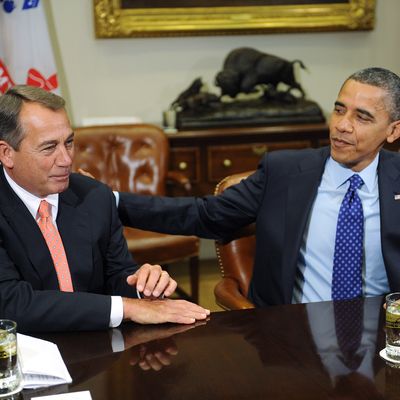
The Obama presidency has been an agonizing time for those few remaining moderate Republicans. They fully oppose their party’s extremism, but the gravitational loyalty of partisan attachment prevents them from confronting it head-on. The most common coping mechanism is to imagine a moderate future for the party that always lies just around the corner, merely awaiting the latest promising Republican to flesh out a few details.
A more interested approach is displayed in the work of Michael Gerson, a former Bush administration speechwriter and a key figure in the development of the “compassionate conservatism” slogan. Gerson’s method of reconciling his party loyalty and disdain for the party’s stance is to blame it all on Obama. Today’s Gerson column is fascinating on a purely psychological level.
The topic is the fiscal showdown between Obama and the House Republicans. Gerson argues that the House cannot responsibly threaten not to lift the debt ceiling and that the reasonable compromise would be to reform the tax code in a way that raises revenue while also trimming spending on retirement programs. (He endorsed the latter view more fully a week ago.) That is also Obama’s position, but Republicans in the House reject it.
Gerson sees this standoff as confirmation of Obama’s cynicism. Obama, he writes, “knows that Republicans are forced by the momentum of their ideology to take positions on spending that he can easily demagogue.” They’re forced by ideology. There’s nothing they can do about it! The ideology has momentum. Republicans are merely along for the ride.
Having absolved the GOP for any role in its own extremist posture, Gerson proceeds to lay out the president’s dastardly scheme:
[Force] the GOP to surrender on the debt limit, with nothing in return. Require Republicans to accept new taxes in exchange for any real spending reductions. If they agree, their caucus is fractured (again). And if they refuse (which they are likely to do), paint them as obstructionists and extremists who are willing to destroy the economy/the nation’s credit rating/the military for their own ideological purposes.
But of course requiring an increase in the debt ceiling without policy concessions is what Gerson believes should happen as well, and it is also what happened under George W. Bush and every previous president. And balancing spending cuts with higher revenue is also the result Gerson endorses.
In Gerson’s mind, though, adopting a sensible, popular stance is a devious ploy, as it will inevitably force Republicans to reject it and thus “expose their internal divisions and unpopular policy views.” As a result, Gerson concludes, Obama’s scheme of agreeing with Gerson on the long-term debt “delays any serious action on long-term debt.”
Here’s the really devious part of Obama’s gambit. After Republicans are forced to reject his sensible and popular positions, they will likely shut down the government, thereby hurting the public and making them like Obama even more and Republicans even less.
He is a sneaky one, that Obama.






























